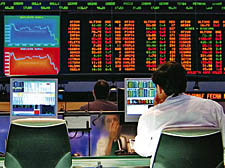| |

Complicated financial bundling has caused the current meltdown |
Shares drop, banks wobble... we have to go back to making things
Now that it’s goodbye to the men in red braces and huge bonuses, who is left to power the economy? asks John Mills. Step forward the almost-forgotten manufacturer
WHAT odds would you have got on a bet a year ago that by the middle of October 2008 the Royal Bank of Scotland would have been nationalised?
Who would have believed that a major American investment bank like Lehman Brothers would have gone bust – or even that stockmarkets around most of the world would have fallen by about 40 per cent?
The behaviour of many banks – and those who work in them – is surely inexcusable. There are always risks in the commercial world and one of the most important aspects of running any business is to be aware of the risks which are being taken and to be reasonably certain that their downside consequences can be managed.
No such basic rules appear to have been evident in much of what the financial community has been doing over the last few years.
Reckless mortgage lending, ever increasingly complicated financial bundling and myriad new intermediaries have left almost all financial institutions with no way of telling what their assets are really worth. This is what has caused the current financial meltdown.
Will this contagion spread to the rest of the economy? To some extent it already has.
Sales of big-ticket items such as cars, furniture and appliances have already tumbled. Transactions in the housing market have fallen massively. Unemployment is starting to rise. Most experts, however, doubt whether most of the rest of the economy will be affected that badly. If there is no growth or even a small fall in economic output over the next year or two, the reduction in turnover in financial services and major items of consumer expenditure will largely account for the lost output. The rest of us will carry on much as before.
The world will change, nevertheless. Much of the growth we have seen in Britain over the last few years has been in financial services rather than in what many people refer to, with some justice, as the real economy. The collapse in confidence in the City and the banks is bound to make relying as heavily on their activity as we have done recently seem a poor way ahead for the future.
What, however, is to replace financial services as a driver for the economy in years to come? This is the really crucial question and the success which the government – to give credit where credit is due – seems to have achieved in leading the way in containing the current financial problems is going to leave this question as yet unanswered.
What could we do? How, especially, are we going to pay our way in the world? If we are not going to rely on financial services to do this, the only real alternative is to go back to being better at manufacturing. The oil is running out. We are never going to run a trade surplus on tourism. We need to make more goods and to sell them abroad.
Is this possible? I think it could be, but not with our economy in thrall to the City and the Bank of England. Instead we need to run our affairs in a way which helps industry and not finance, entrepreneurs and not old money, the provinces more than London, and blue collar workers more than those in red braces earning huge bonuses in the Square Mile.
We need much lower interest rates, a far lower exchange rate to make our exports competitive, and then, when it is easier to make money in manufacturing than in finance, higher salaries in industry than in financial services – exactly what you have in the successful Far Eastern economies.
When many of the most talented people are in manufacturing – as they are in places like China – the huge productivity gains which industry can achieve drives up the growth rate.
Will this happen? Maybe, maybe not – but the disgrace in which the City and the banks now find themselves may provide us with the best opportunity there has been for a long time to wrest power away from those in finance to where, in the economy, it really ought to be, which is in making and selling the goods which the world wants.
|
 |
|
| |
| |
| |
| |